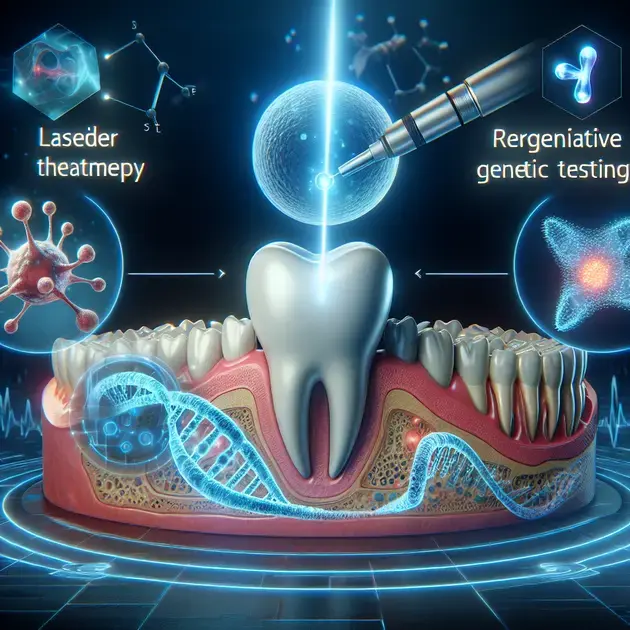Are you struggling with periodontitis and looking for effective medication options? Look no further! This comprehensive guide will walk you through various treatment options to help you manage and improve your condition.
With advancements in dental technology, there are now more choices than ever when it comes to treating periodontitis. From traditional therapies to innovative new medications, this guide will cover everything you need to know to make informed decisions about your oral health.

An Overview of Periodontitis Medication Options
Periodontitis medication options play a crucial role in managing the symptoms and progression of this oral condition. There are various types of medications available that target different aspects of periodontitis, such as reducing inflammation, controlling bacterial growth, and promoting gum healing. It is essential to understand the different medication options to determine the most effective treatment plan for each individual.
One of the traditional treatment methods for periodontitis is the use of antimicrobial mouth rinses. These rinses contain active ingredients that help kill harmful bacteria in the mouth, reducing plaque buildup and inflammation. An example of such a mouth rinse is Listerine, which is widely available over the counter at pharmacies and supermarkets. To use this product effectively, it is recommended to swish the mouth rinse around in the mouth for 30 seconds to 1 minute, twice a day after brushing teeth.
In addition to mouth rinses, another common medication option for periodontitis is the use of antibiotic therapy. Antibiotics can be prescribed by a dentist or periodontist to help control bacterial infection and reduce inflammation in the gums. One example of an antibiotic commonly used to treat periodontitis is doxycycline. This medication is usually taken in the form of pills, and the dosage and duration of treatment will depend on the severity of the condition.
For patients with more advanced periodontitis, surgical intervention may be necessary in addition to medication therapy. Procedures such as scaling and root planing, flap surgery, and bone or tissue grafts may be recommended to remove deep-seated tartar and repair damage to the gums and bone. These surgical treatments are often performed by a periodontist and require careful post-operative care to ensure proper healing.
Overall, a combination of medication therapy, good oral hygiene practices, and regular dental visits is essential for effectively managing periodontitis and preventing further progression of the disease.
Exploring Traditional Treatment Methods
Traditional treatment methods for periodontitis have been used for many years to help improve the health of the gums and prevent the progression of the disease. These methods often focus on reducing inflammation, controlling bacterial growth, and promoting gum healing through various procedures and medications.
One common traditional treatment method for periodontitis is scaling and root planing. This procedure is performed by a dental hygienist or periodontist and involves deep cleaning of the gums to remove plaque and tartar buildup around the teeth and roots. Scaling and root planing help to reduce inflammation and promote the healing of the gums, preventing further damage to the bone and tissues supporting the teeth.
Another traditional treatment method for periodontitis is the use of locally applied antimicrobials, such as Arestin. Arestin is an antibiotic powder that is placed directly into the pockets around the teeth after scaling and root planing. This medication helps to kill bacteria and reduce inflammation in the gums, promoting better healing and overall oral health. To access more information about Arestin and how it is applied, you can visit the official website of the manufacturer or consult with your dentist.
In addition to these procedures, maintaining good oral hygiene practices at home is crucial for supporting the effects of traditional treatment methods for periodontitis. Brushing teeth twice a day, flossing regularly, and using an antimicrobial mouth rinse can help control bacterial growth and reduce the risk of gum disease progressing. It is also important to attend regular dental check-ups and cleanings to monitor the health of the gums and receive professional care when needed.
By combining traditional treatment methods with modern advancements in periodontal care, individuals can effectively manage periodontitis and improve their oral health for the long term.
The Rise of Innovative Medication Solutions
In recent years, innovative medication solutions have emerged to offer new ways of treating periodontitis and improving patient outcomes. These advancements in medication therapy aim to target the underlying causes of gum disease more effectively and provide patients with alternative treatment options to traditional methods.
One innovative medication solution for periodontitis is the use of probiotics. Probiotics are beneficial bacteria that can be taken orally or applied topically to the gums to help restore a healthy balance of bacteria in the mouth. By introducing good bacteria, probiotics can help reduce inflammation, fight off harmful bacteria, and promote gum healing. One example of a probiotic product for oral health is EvoraPro, which comes in the form of a chewable tablet. To learn more about EvoraPro and its benefits, you can visit the official website of the manufacturer.
Another emerging medication solution for periodontitis is the use of growth factors. Growth factors are proteins that help stimulate the regeneration of tissues damaged by gum disease, promoting faster healing and repair. These proteins can be applied directly to the gums during surgical procedures or in the form of topical gels or mouth rinses. Products like Emdogain contain growth factors that have shown promising results in promoting gum tissue regeneration. To find out more about Emdogain and how it is used in periodontal therapy, you can consult with a dental professional.
Overall, the rise of innovative medication solutions for periodontitis offers patients new possibilities for managing their oral health and preventing the progression of gum disease. By staying informed about these advanced treatment options and working closely with dental providers, individuals can find the most suitable medication therapy to support their periodontal health and overall well-being.

**Understanding the Science Behind Periodontitis Medication**
Periodontitis is a severe gum infection that can lead to tooth loss if left untreated. Understanding the science behind periodontitis medication is crucial for effective management of this condition. Medications used to treat periodontitis aim to reduce inflammation, control bacterial growth, and promote gum healing.
One common medication prescribed for periodontitis is antimicrobial mouthwash. This type of mouthwash contains active ingredients such as chlorhexidine, which helps reduce bacteria in the mouth and prevent infection. Other medications include antibiotics, which can be taken orally or applied directly to the gums in gel form to target specific strains of bacteria causing the infection.
In addition to traditional medications, recent advancements in periodontitis treatment have introduced probiotics as a natural alternative. Probiotics are beneficial bacteria that can help restore the balance of the oral microbiome, reducing inflammation and supporting gum health. Incorporating probiotic-rich foods or supplements into your diet may complement conventional treatments for periodontitis.
It’s essential to consult with a healthcare professional to determine the most suitable medication for your specific case of periodontitis. Different medications may be prescribed based on the severity of the infection, underlying health conditions, and individual response to treatment. By understanding the science behind periodontitis medication, you can make informed decisions about your oral health.
**Navigating Alternative Treatment Approaches for Periodontitis**
While traditional medications play a significant role in managing periodontitis, exploring alternative treatment approaches can provide additional benefits for gum health. Navigating alternative therapies for periodontitis involves considering natural remedies, lifestyle modifications, and complementary treatments to support traditional medication.
One alternative approach to periodontitis treatment is herbal therapy. Certain herbs, such as echinacea and sage, have antimicrobial and anti-inflammatory properties that can aid in combating gum infection and reducing inflammation. Herbal mouth rinses or topical applications may complement conventional periodontitis medication.
Another alternative treatment to explore is acupuncture. Acupuncture is a traditional Chinese medicine practice that involves stimulating specific points on the body to promote healing and alleviate pain. Some studies suggest that acupuncture can help reduce inflammation and improve gum health in individuals with periodontitis.
Furthermore, lifestyle modifications, such as maintaining a balanced diet rich in vitamins and minerals, practicing good oral hygiene habits, and managing stress, can positively impact periodontal health. These holistic approaches aim to address the root causes of periodontitis and support overall well-being.
When considering alternative treatment approaches for periodontitis, it’s essential to discuss with your healthcare provider to ensure compatibility with existing medications and personalized treatment plans. By navigating various options, you can create a comprehensive approach to managing periodontitis and promoting long-term gum health.
**Unveiling Cutting-Edge Solutions for Periodontitis Management**
Advancements in dental technology and research have led to cutting-edge solutions for managing periodontitis more effectively. Unveiling these innovative approaches can revolutionize the way we approach gum health and enhance treatment outcomes for individuals with periodontitis.
One cutting-edge solution for periodontitis management is laser therapy. Laser devices can target and eliminate bacteria beneath the gumline without invasive procedures, promoting faster healing and reducing the risk of infection. Laser therapy is minimally invasive and can result in less discomfort compared to traditional surgical techniques.
In addition to laser therapy, regenerative treatments such as platelet-rich plasma (PRP) therapy have shown promising results in promoting tissue regeneration and gum healing. PRP contains growth factors that stimulate the body’s natural healing process, accelerating tissue repair and regeneration in the gums affected by periodontitis.
Furthermore, advances in genetic testing allow for personalized treatment plans based on an individual’s genetic predisposition to periodontitis. By identifying genetic risk factors, healthcare providers can tailor medications and interventions to target specific vulnerabilities and improve treatment outcomes.
Exploring these cutting-edge solutions with your dental provider can open new possibilities for effectively managing periodontitis and preserving gum health. By staying informed about the latest advancements in periodontitis management, you can access state-of-the-art treatments that enhance your oral health journey.
Conclusion
In conclusion, understanding the science behind periodontitis medication is paramount for effectively managing this severe gum infection. The use of medications such as antimicrobial mouthwash and antibiotics, along with recent advancements like probiotics, plays a crucial role in reducing inflammation, controlling bacterial growth, and promoting gum healing. By consulting with healthcare professionals, individuals can determine the most suitable medication tailored to their specific case of periodontitis, considering factors like infection severity and individual response.
Furthermore, exploring alternative treatment approaches for periodontitis, such as herbal therapy, acupuncture, and lifestyle modifications, can offer additional benefits in supporting gum health. These holistic approaches, when combined with traditional medication, provide a comprehensive strategy to address the root causes of periodontitis and enhance overall well-being. Engaging in discussions with healthcare providers ensures compatibility with existing medications and personalized treatment plans for optimal results.
Moreover, unveiling cutting-edge solutions like laser therapy, platelet-rich plasma (PRP) therapy, and personalized genetic-based interventions represents a significant advancement in periodontitis management. These innovative approaches offer minimally invasive treatments, tissue regeneration, and targeted interventions based on individual genetic predispositions. By staying informed about the latest advancements and collaborating with dental providers, individuals can access state-of-the-art treatments that revolutionize gum health management and improve treatment outcomes in the journey towards optimal oral health.



